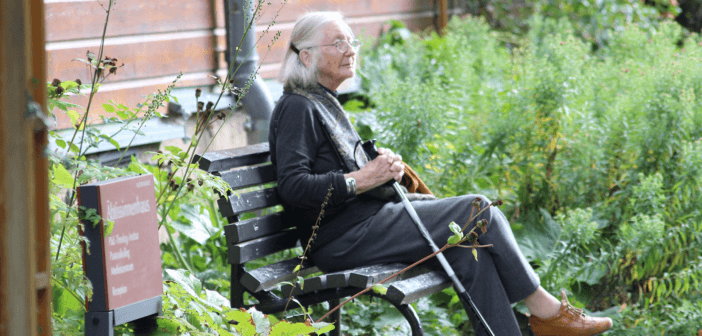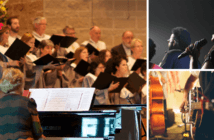Jessica L. Anschutz of the Lewis Center staff shares ideas for pastoral care and spiritual support for persons with dementia and their caregivers. As the number of dementia diagnoses grows, congregations have an opportunity to serve their community in meaningful ways.
“You don’t need to visit Ed; he has dementia.” I have heard a variation of this sentence more times than I can count. I am increasingly concerned by how quickly congregations and pastors dismiss or ignore faithful constituents as dementia progresses. As congregations age and the percentage of the population with dementia and dementia-related diagnoses grows, there is an expanding opportunity for ministry with persons with dementia and their caregivers through advocacy, education, and adapting ministries to allow persons with dementia and their caregivers to participate actively.
Spiritual care
As memory fades, a person’s soul remains, so tend to the spiritual needs of persons with dementia and their caregivers. Visit them even if they do not remember their name, know who you are, or that you are connected to their congregation. Tend to the grief, especially the anticipatory grieving of caregivers. Remind caregivers and care receivers that they are God’s beloved children who are created in the image of God. Affirm God’s loving presence and God’s grace and forgiveness in the midst of the challenges of life with dementia. Value and celebrate the work of caring for persons with dementia.
In No Act of Love is Ever Wasted (Upper Room, 2009), Jane Marie Thibault and Richard L. Morgan call us to reenvision caregiving as an “intentional, mutual spiritual path.” They write that living with dementia:
- Forces one to ponder the meaning of one’s changed life
- Brings together very intimately people who are committed to one another in some way
- Often requires heroic acts of forgiveness and self-sacrificing love
- Lasts for a long time
- Involves a certain “dailiness” or patterned way of life
- Always faces loss and death
- Is an ultimate response to Jesus’ command to “love one another as I have loved you.”
Consider how your congregation’s ministries can best support those journeying on this mutual path.
Ministry of presence
Persons In the early stages of a dementia diagnosis are often aware that they can no longer do things that they used to do and are increasingly forgetful. Create welcoming spaces and opportunities for people to talk and share their stories, fears, and concerns. Hear their laments as they grieve no longer being able to serve their beloved church in the ways they were accustomed to serving. Practice active listening. When a story is repeated, listen to it again. Ask questions to engage creativity, rather than correct.
Caregivers also need to know that they are not alone and to have opportunities to share their stories, fears, and concerns. Hear their frustration about being asked the same question a dozen times in only a few minutes. Hear their laments as plans are modified to address the needs of their loved one. Acknowledged that their loved ones are still beloved by God even as they are changing.
Worship
Offer a worship service designed specifically for persons with dementia and their caregivers, so that they may comfortably worship together. Be creative and engage their imaginations and the five senses. Sing familiar hymns. Focus on a single scripture reading. Offer a brief inspirational message (three to five minutes) rather than a longer sermon. Use a space that fits the size of the group so that a smaller group is not lost in a large empty space.
Be prepared for questions and interruptions. Be a calm, non-anxious presence. Answer questions as they arise and allow the Holy Spirit to work in and through all who are gathered. Share in the familiar rituals of the church. Remind those who are gathered of their baptisms, invite them to share in the Lord’s Supper, journey with them through the seasons of the liturgical calendar.
Collaborate
Collaborate with nearby congregations and community organizations on a weekly worship service and/or ministries of support for persons with dementia and their caregivers. Partner with organizations such as the Alzheimer’s Association to provide educational programming and support to families and persons with dementia.
A congregation in New York partnered with the Alzheimer’s Association for a series of educational programs that were advertised to the wider community. The congregation’s prayer shawl ministry gave pocket prayer shawls to the workshop participants, a tangible reminder of the congregation’s prayerful support for caregivers and those who receive their care.
Advocate
There are a number of ways congregations can advocate on behalf of persons with dementia and their loved ones. Support efforts to raise awareness about the need for an increase in federal Alzheimer’s and dementia research funding and resources. There is a growing shortage of home health care workers due to low wages. Advocate for a living wage for home health care workers, so that more people may continue to live safely in their own homes.
Related Resources
- Nurturing a Dementia-Friendly Church by Kenneth Carder
- Tapping the Gifts of Homebound Leaders by Susan E. Gillies and Ingrid Dvirnak







